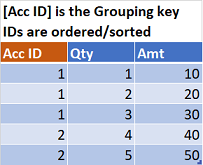Hi @Djpejsen
Could you play with this workbook and let me know? With the hope this is good this time as I run out of aspirin :-)
PQ - iterate over transactons and use aggregrate sum as target
Hi guys
I have some forecast transactions that I need to adjust if there is coming a Sales Order in the same week as forecast, based on the Sales order qty. and the aggregate sum
There is general 4 conditions for the iteration
Condition 1
Sales order in WK02 of 10 pcs
Forecast before adjustment
W01 : 50
W02 : 50
W03 : 50
W04 : 50
Aggregate sum 200
Forecast after adjustment
W01 : 50
W02 : 40 (Forecast)
W02 : 10 (Sales order)
W03 : 50
W04 : 50
Aggregate sum 200
——————————————
Condition 2
Sales order in WK02 of 60 pcs
Forecast before adjustment
W01 : 50
W02 : 50
W03 : 50
W04 : 50
Aggregate sum 200
Forecast after adjustment
W01 : 50
W02 : 0 (Forecast)
W02 : 60 (Sales order)
W03 : 40 (Forecast)
W04 : 50
Aggregate sum 200
——————————————
Condition 3
Sales order in WK02 of 110 pcs
Forecast before adjustment
W01 : 50
W02 : 50
W03 : 50
W04 : 50
Aggregate sum 200
Forecast after adjustment
W01 : 50
W02 : 0 (Forecast)
W02 : 110 (Sales order)
W03 : 0 (Forecast)
W04 : 40
Aggregate sum 200
——————————————
Condition 4
Sales order in WK02 of 50 pcs
Forecast before adjustment
W01 : 50
W02 : 50
W03 : 50
W04 : 50
Aggregate sum 200
Forecast after adjustment
W01 : 50
W02 : 0 (Forecast)
W02 : 50 (Sales order)
W03 : 50
W04 : 50
Aggregate sum 200
-
 Lz._ 8,991 Reputation points
Lz._ 8,991 Reputation points2021-02-17T11:51:51.113+00:00
9 additional answers
Sort by: Newest
-
 Lz._ 8,991 Reputation points
Lz._ 8,991 Reputation points2021-03-07T18:21:01.327+00:00 Something I should have mentioned earlier. If your nested tables results of a Grouping (Table.Group) operation and the column you GroupBy (the key) is already ordered before grouping, i.e.:

you can speed up the grouping operation using the 4th optional parameter (groupKind) set to GroupKind.Local, i.e.:
= Table.Group(InputTable, {"Acc ID"}, {{myAggregations}}, GroupKind.Local)
The doc. of the 4th param. "disappeared" when they moved the documention to https://learn.microsoft.com/ a few years ago. It used to say:
- A local group is formed from a consecutive sequence of rows from an input table with the same key value
- A global group is formed from all rows in an input table with the same key value
Also check ImkeF's Speed/Performance aspects article, there's probably a few things for you
Hope this helps... -
 Lz._ 8,991 Reputation points
Lz._ 8,991 Reputation points2021-03-06T09:17:56.983+00:00 Hi @Djpejsen
To debug a function no choice:
- Take one of your nested table as a source (myNestedTable below)
- Adjust your code as below
- In the PQ Editor identify the step that raises the error
Couple of comments:
- Not a good idea to buffer inside a function. Each time it's called what you buffer is added to what's already in memory (ram) until...the query evaluation completes
- You already have an issue with step Sales as it returns a scalar value, not a Table //(SourceTable as table) as number =>
let
//Source = Table.Buffer(SourceTable),
Source = myNestedTable,
Forecast = Table.Column(Source, "FC"),
...
...
ToTable = Table.FromColumns(ToColumns, Table.ColumnNames(Source) & {"Correction"}),
Typed = Table.TransformColumnTypes(ToTable, {
{"Correction", Int64.Type}})
in
Typed
-
 Lz._ 8,991 Reputation points
Lz._ 8,991 Reputation points2021-03-15T14:41:48.023+00:00 Hi @Djpejsen
Is it possible to have both [Correction] and [Rest] in the output? ToColumns = Table.ToColumns(Source) & {Correction} & {Rest}
(a never ending story :) I don't know where you are (cf. The if statements have been adjusted + our previous exchanges) so I kept the same example you Accepted as answer and revised the corresponding BuildCorrection function - Workbook avail. here
(SourceTable as table) as table => let Source = SourceTable, Forecast = Table.Column(Source, "Current FC"), CorrectionRest = List.Generate( ()=> [ i = 0, forecast = Forecast{i}, sales = Table.First(Source)[Sales Order], Correction = if sales > 0 then -forecast else 0, Rest = if sales = 0 then 0 else forecast-sales ], each [i] < List.Count(Forecast), each [ i = [i] + 1, forecast = Forecast{i}, Correction = if [Rest] = 0 then 0 else if [Rest] > 0 then List.Min({forecast, [Rest]}) else List.Max({-forecast, [Rest]}), Rest = if [Rest] < 0 then if [Rest] > -forecast then 0 else [Rest]+forecast else List.Max({[Rest]-forecast, 0}) ], each [ [Correction], [Rest] ] ), ToTable = Table.FromColumns( Table.ToColumns(SourceTable) & Table.ToColumns(Table.FromRecords(CorrectionRest, type table [Correction=Int64.Type, Rest=Int64.Type])), Table.ColumnNames(SourceTable) & {"Correction", "Rest"} ) in ToTable -
Djpejsen 41 Reputation points
2021-03-15T13:34:47.077+00:00 (SourceTable as table) as table => let Source = SourceTable, Forecast = Table.Column(Source, "FC Qty"), Correction = List.Generate( ()=> [ i = 0, forecast = Forecast{i}, sales = Table.First(Source)[SO Qty], correction = if forecast = null or forecast = 0 then 0 else -forecast, rest = if forecast = null or forecast = 0 then 0 else List.Sum({sales,-forecast}) ], each [i] < List.Count(Forecast), each [ i = [i] + 1, forecast = Forecast{i}, correction = if [rest] = 0 then 0 else if [rest] > 0 then if [rest] < forecast then -[rest] else -forecast else -[rest] , rest = if [rest] <= 0 then 0 else if [rest] > 0 then if [rest] < forecast then 0 else [rest]-forecast else -[rest] ], each [correction] ), ToColumns = Table.ToColumns(Source) & {Correction}, ToTable = Table.FromColumns(ToColumns, Table.ColumnNames(Source) & {"Correction"}) in Table.TransformColumnTypes(ToTable, {{"Correction", Int64.Type}})





